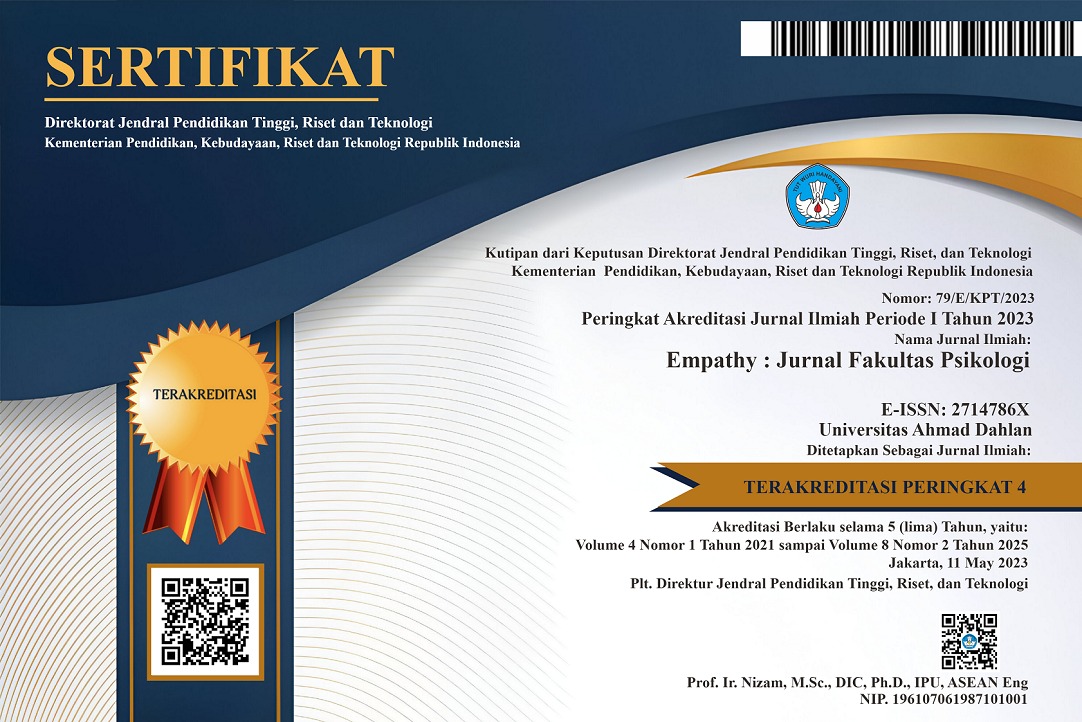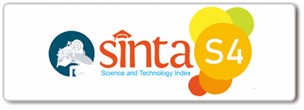Development Of An Android-Based Cognitive Behavior Modification Cybercounseling Asynchronous Group Application To Increase Student Self-Confidence
Abstract
In recent years, student self-confidence has become a higlight and an issue in the world of education in Indonesia. Self-confidence is an important aspect for student, because it can influence academic achievment, social development, and students psychological well-being. Based on the background of this probem, the urgency of this research was carried out to provide an innovative application technology that aims to increase students’self-confidence through the application of a cognitive behavior modification approach. This application is designed to be able to provide online counseling services that facilitate students in groups called asynchronous group cybercounseling. This research method uses development or research and development (R&D) including determining potential and problems, collecting information, product design, design validation, and design revision. With this application, it is hoped that it can provide innovation and assistance that will have a positive contribution in increasing students’ self-confidence, helping students overcome challenges, and developing students personal skills at school and in society.
Keywords
Full Text:
PDFReferences
Agustine, P. A., Christiana, E., Pd, S., & Pd, M. (2018). Penerapan strategi cognitive restructuring untuk meningkatkan percaya diri siswa kelas x ips 1 sman 1 ponggok kabupaten blitar. 8(1)
Aryani. (2008). Efektifitas pendekatan cognitive behavior modification (CBM) untuk mengelola stres belajar siswa. Disertasi. Program Pascasarjana Universitas Negeri Malang.
Bloom, J. & G. Walz. (2004). Cybercounseling and cyber learning: an ancore. greensboro: Caps Press.
Fahyuni, E. F., Romadlon, D. A., Hadi, N., Haris, M. I., & Kholifah, N. (2020). Model aplikasi cybercounseling Islami berbasis website meningkatkan self-regulated learning. Jurnal Inovasi Teknologi Pendidikan, 7(1), 93–104. https://doi.org/10.21831/jitp.v7i1.34225
Hidayah, N. & M. Ramli. (2013). Cybercounseling kognitif behavioral di Malang Raya, Jawa Timur. Malang: Lembaga Penelitian UM
Hidayah, N. (2015). Peluang dan tantangan guru BK berdaya saing di era MEA. Makalah dalam Seminar Nasional Bimbingan dan Konseling: Profesi BK di Era Masyarakat Ekonomi ASEAN (MEA). Malang: Universitas Muhammadiyah Malang.
Meichenbaum, D. (1986). Cognitive behavior modifcation. Helping People Change: A Textbook of Methods, 346 – 380.
Jerizal, P dan Hanung S. (2017). Kajian konseptual layanan cybercounseling. Jurnal Konselor, Vol. 06, 01.
Khasanah, F., Utami, R. D., & Hartati, S. (2021). Penerapan Pembelajaran Tematik Berbasis Problem-Based Learning untuk Meningkatkan Hasil Belajar dan Sikap Percaya Diri Siswa. Journal of Integrated Elementary Education, 1(2), 98–107. https://doi.org/10.21580/jieed.v1i2.9220
Kraus, Ron., Stricker, G., Speyer, C. (2011). Online Counseling: A Handbook For Mental Health Profesionals. New York: USA. Academic Press (AP)
Pasmawati H. “Cyber Counseling Sebagai MetodePengembangan Layanan Konseling Di Era Global”. JurnalSyi’ar (Vol. 16 No. 1 2016)
Prabawa, A. F., & Antika, E. R. (2021). The Effectiveness of Reality Cybercounseling in Improving Senior High. 10
Prabowo, I. I., Agesti, L. M. I., & Kharisma, S. (2022). The Influence of Basic Communication Counseling Skills on the Success of Cybercounseling. Social, Humanities, and Educational Studies (SHEs): Conference Series, 5(2), 497. https://doi.org/10.20961/shes.v5i2.59385
Pratiwi, A., & Nurwahidin, M. (2021). PENINGKATAN KONSELING MAHASISWA MELALUI CYBERCOUNSELING BERBASIS ASYNCHRONOUS CHAT DI UNIVERSITAS LAMPUNG.
Prasetya, A. F. (2017). Model cybercounseling: telaah konseling individu online chat-asynchronous berbasis aplikasi android. In: Prosiding Seminar Bimbingan dan Konseling.
Prasetyo, Y.R. & Djuniadi. (2015). Implementasi E-konseling pada Social Learning Network. Edu komputika Journal.
Putri, M. (2023). Pemanfaatan cybercounseling pada layanan bimbingan dan konseling di sekolah. Orien: Cakrawala Ilmiah Mahasiswa, 2(3), 181–190. https://doi.org/10.30998/ocim.v2i3.8246
Resta, C. A., Nur, T., & Herdiana, Y. (2022). Pembiasaan Kegiatan Muhadharah sebagai Upaya Meningkatkan Percaya Diri Siswa di MAN 2 Karawang. ISLAMIKA, 4(4), 743–753. https://doi.org/10.36088/islamika.v4i4.2118
Sanusi, H. P., Gustini, N., Suryana, Y., & Almafahir, A. (2022). Management of Guidance and Counseling Service Based Cybercounseling in Madrasah in The New Normal Era. AL-ISHLAH: Jurnal Pendidikan, 14(4), 7123–7130. https://doi.org/10.35445/alishlah.v14i4.2431
Saputra, W. N. E., & Prasetiawan, H. (2018). Meningkatkan Percaya Diri Siswa melalui Teknik Cognitive Defusion. Jurnal Kajian Bimbingan dan Konseling, 3(1), 14–21. https://doi.org/10.17977/um001v3i12018p014
Setiawan, I., & Mugiarso, H. (2021). Konseling Kelompok Berbasis Cybercounseling Pendekatan Rational Emotive Behaviour Theraphy (REBT) untuk Meningkatkan Kontrol Diri Siswa. ENLIGHTEN (Jurnal Bimbingan dan Konseling Islam), 4(1), 30–41. https://doi.org/10.32505/enlighten.v4i1.2635
Sugiyono. (2019). Metode Penelitian Pendidikan (Kuantitatif, Kualitatif, Kombinasi, R&d dan Penelitian Pendidikan).
Yonita, E. N., & Karneli, Y. (2019). The Effectiveness of the Cognitive Behavior Modification Approach with Group Settings to Reduce Bullying Behavior. Jurnal Neo Konseling, 1(3). https://doi.org/10.24036/00136kons2019
Yuliati, C. L., & Susianna, N. (2023). Penerapan Model Pembelajaran Discovery Learning Dalam Meningkatkan Keterampilan Proses Sains, Berpikir Kritis, dan Percaya Diri Siswa. Scholaria: Jurnal Pendidikan dan Kebudayaan, 13(1), 48–58. https://doi.org/10.24246/j.js.2023.v13.i1.p48-58
Wilson, A. (2020). Penerapan Metode Pembelajaran Daring (Online) melalui Aplikasi Berbasis Android saat Pandemi Global. SAP (Susunan Artikel Pendidikan), 5(1). https://doi.org/10.30998/sap.v5i1.6386
DOI: http://dx.doi.org/10.12928/empathy.v7i1.27292
Refbacks
- There are currently no refbacks.
Copyright (c) 2023 Parhan Fauzan

This work is licensed under a Creative Commons Attribution-ShareAlike 4.0 International License.
================================================================================================
ISSN 2303-114X (print) || 2714-786X (online)
Organized by the Faculty of Psychology
Published by Universitas Ahmad Dahlan, Yogyakarta
Website: http://journal.uad.ac.id/index.php/EMPATHY
email: empathy.jfp@psy.uad.ac.id
Lisensi Creative Commons Atribusi-BerbagiSerupa 4.0 Internasional




